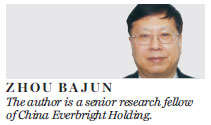Big strides made in Hong Kong's economy, but with serious lessons
Updated: 2015-07-02 07:50
By Zhou Bajun(HK Edition)
|
|||||||||
The Hong Kong SAR has gone through 18 years of ups and downs. On one hand, the city, as an international hub for trade, finance and transportation, has made significant achievements via economic integration with the mainland. On the other, it has wasted precious time and resources in political wrangling that has taught us some serious lessons.
Economic integration accelerated when Hong Kong signed the Closer Economic Partnership Arrangement (CEPA) in 2003. The pact was initiated by the HKSAR Government and promoted by the central government while Hong Kong was experiencing its worst economic recession in its history amid the SARS epidemic. Hong Kong then needed urgent economic aid and Beijing lost no time in providing as much help as necessary. Hong Kong people should never forget that the Individual Visit Scheme (IVS) had enabled the city to overcome two economic recessions - in 2003 and 2009. Mainland visitors to Hong Kong have contributed much to the local economy spending billions of dollars here, accounting for 40 percent of the city's retail sales, which have been a major driving force behind its GDP growth.
Since 2003, regular supplements have been made to the CEPA annually, the latest being Supplement X signed on Aug 29, 2013. By continuously broadening and enriching CEPA, a free trade zone for commodities has been established across the Shenzhen River. In 2011, the central government said it aimed for the basic liberalization of trade in services between the mainland and Hong Kong by the end of the country's 12th Five-Year Plan (2011-15) period.
In light of the economic globalization in the new century, Hong Kong should maintain its economic status through cooperation with the Pearl River Delta region in Guangdong. Late last year, the agreement between Hong Kong and the mainland on achieving basic liberalization of trade in services in Guangdong was inked.
Meanwhile, the city is strengthening economic links with other major mainland cities, especially Shanghai. And, on Nov 17 last year, the Shanghai-Hong Kong Stock Connect program came into being.
Any international financial center needs a broad economic base measured by population and land. Hong Kong - a tiny city with just 7 million residents and around 1,000 square kilometers of land - has to extend its financial services to the whole nation of 1.3 billion people and 9.6 million square kilometers of land. And, the mainland has been the No 1 engine driving the world economy in recent years. Therefore, to the SAR, the sooner the Shenzhen-Hong Kong stocks cross-trading is launched, the better it is for Hong Kong's financial markets.
Bolstered by the mainland economy, Hong Kong occupies the top position in the global securities markets and is now the second-largest area for direct investment inflow and outflow in the world. If Hong Kong wants to make itself a bona fide global financial center, further integration with the mainland is a must.
Yet, in the past 12 years since the July 1 demonstration in 2003 Hong Kong has been continuously harassed by the opposition camp. The troublemakers have gone out of their way to undermine the SAR government's lawful administration and frequently violated the Basic Law in a bid to jeopardize the implementation of the "One Country, Two Systems" policy, much to the detriment of the city's economic development. On the other hand, while becoming increasingly reliant on the mainland economy for growth, Hong Kong has not been able to achieve the level of structural transformation it wants from a services-centric economy to a knowledge-based innovative economy. As a result, it has been surpassed by Singapore in some key respects, while Shanghai is breathing down its neck.
One's merit is also one's shortcoming. Hong Kong has benefited greatly from its economic integration with the mainland, but not without some tough lessons along the way. The most alarming of these lessons, perhaps, is that Hong Kong people might not realize how easy it is for them to take the mainland for granted. Economic integration should be mutually beneficial. The recent illegal harassment of mainland visitors by a small number of ill-motivated individuals in the name of "nativism" has seriously hurt the feelings of mainland compatriots toward Hong Kong and has led to a noticeable drop in the number of tourist groups, as well as individual visitors. Such "backlashes" will only increase if we don't take them seriously and make improvements for the sake of our own economy.
With the Asia Infrastructure Investment Bank and "One Belt, One Road" program spearheading the next phase of the country's outward economic development strategy, Hong Kong has a great opportunity to play an important role in linking Asia with Europe and Africa and the rest of the world. A magnificent tomorrow beckons and we have every reason to be ready when it comes.

(HK Edition 07/02/2015 page10)